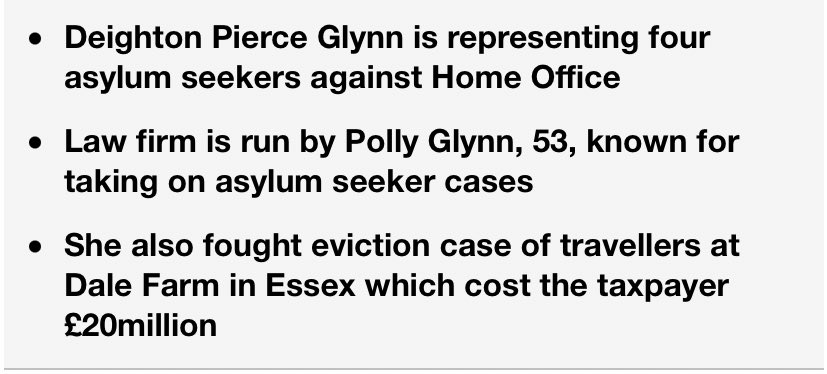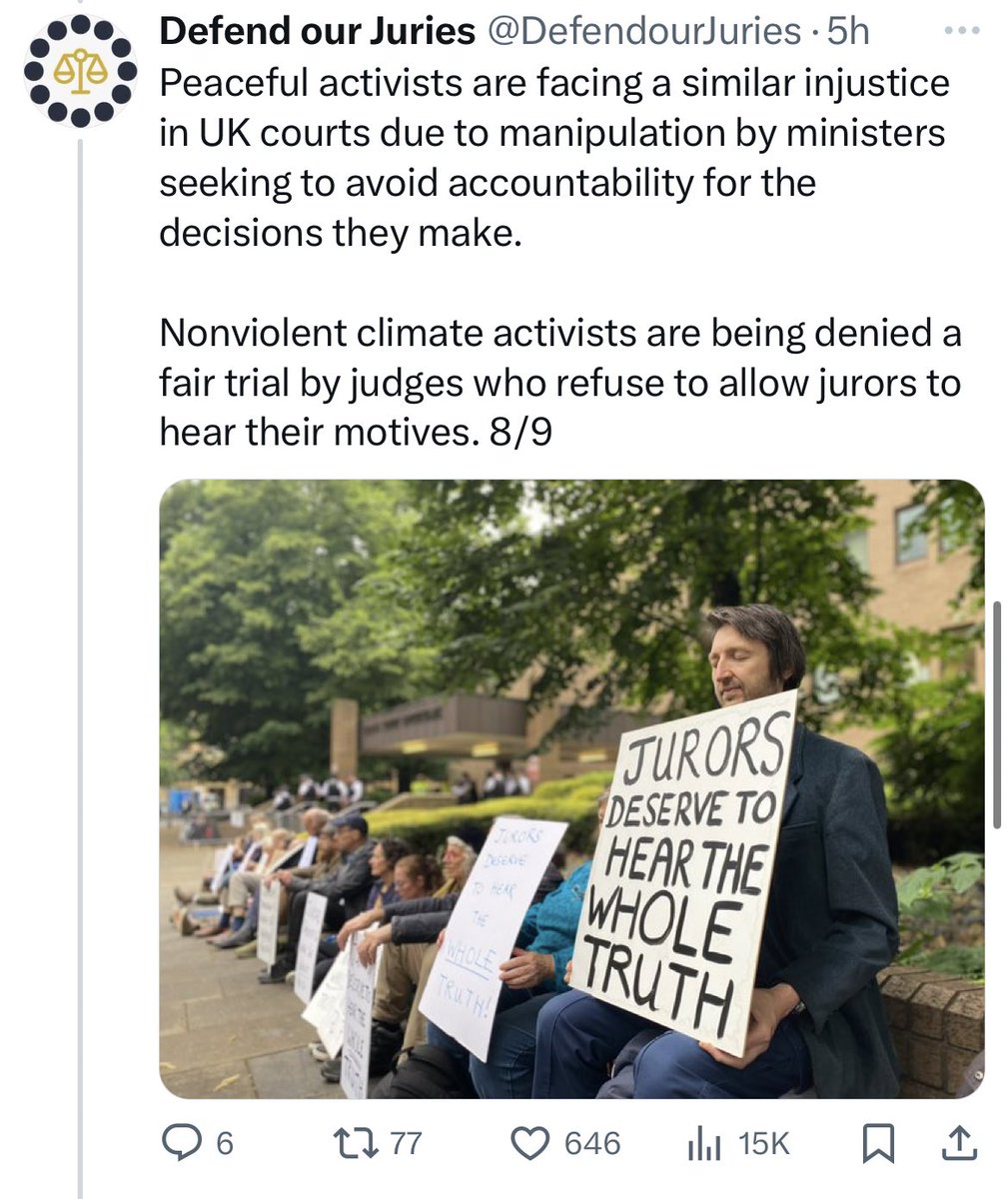It’s time for some Friday #FakeLaw! Welcoming back an old friend of the show, it’s...
The Mail! With its new double whammy in its misrepresentation of legal aid and the rule of law!
Buckle up, kids. [THREAD] 👇
The Mail! With its new double whammy in its misrepresentation of legal aid and the rule of law!
Buckle up, kids. [THREAD] 👇

1. Let’s start with the headline. In a fun twist on yesterday’s court judgment, apparently it was “Human rights lawyers” who “helped brand Napier Barracks illegal”, rather than, say, the Home Secretary deliberately accommodating asylum seekers in dangerous and decrepit conditions 

2. Given the dubious news value of lawyers specialising in asylum and human rights law being involved in asylum and human rights cases, this little intro must serve another purpose.
Subtext: this lawyer helps people we disapprove of (in this case, asylum seekers & travellers).
Subtext: this lawyer helps people we disapprove of (in this case, asylum seekers & travellers).

3. On with the substance.
The first paragraph is, well, it’s false. Completely untrue. Put aside the infantile assumption that anybody who represents asylum seekers is “left-leaning”, the suggestion that the law firm “cost the taxpayer £20million” is false.
The first paragraph is, well, it’s false. Completely untrue. Put aside the infantile assumption that anybody who represents asylum seekers is “left-leaning”, the suggestion that the law firm “cost the taxpayer £20million” is false.

4. The £20m figure relates to the overall estimated cost of evicting travellers from Dale Farm. It comprised policing and council costs.
Not, as the article disingenuously suggests, costs incurred or caused by lawyers.
Pure #FakeLaw.
standard.co.uk/hp/front/trave…
Not, as the article disingenuously suggests, costs incurred or caused by lawyers.
Pure #FakeLaw.
standard.co.uk/hp/front/trave…
5. Straight in here with legal aid. Here’s the thing - when you represent asylum seekers who have no money and are prohibited from earning a living, you find that a lot of your clients need legal aid.
Although (Chapter 7 Fake Law) legal aid has now been removed from most people.
Although (Chapter 7 Fake Law) legal aid has now been removed from most people.

6. Another tasty morsel designed to dial up the reader’s rage, although there is no information given about the merits of these legal challenges. You are just invited to assume it is a vexatious exercise to line the pockets of lawyers and foreigners. 

7. Again, if the Home Office is acting unlawfully, it is not the fault of the lawyers who represent the people who have suffered. If costs are incurred to the taxpayer, this is the fault of the minister responsible - the Home Secretary. 

8. And now onto criminal law! The bad man defending murderers and terrorists.
Spoiler: everybody, no matter what they are accused of doing or have done, is entitled to be treated fairly and lawfully. This requires legal representation. This is the essence of the rule of law.

Spoiler: everybody, no matter what they are accused of doing or have done, is entitled to be treated fairly and lawfully. This requires legal representation. This is the essence of the rule of law.


9. And now onto criminal legal aid.
“Extortionate fees paid to barristers defending criminals”.
No supporting evidence at all. No examples.
Why?
Because it’s a lie. An enormous, whopping lie.
As you can see if you read this story in, umm, The Mail. dailymail.co.uk/femail/article…
“Extortionate fees paid to barristers defending criminals”.
No supporting evidence at all. No examples.
Why?
Because it’s a lie. An enormous, whopping lie.
As you can see if you read this story in, umm, The Mail. dailymail.co.uk/femail/article…

10. But more than that, the figures cited are, well, completely wrong.
The total legal aid bill - civil AND criminal - *was* £2.1bn.
In 2010.
There has since been a real terms cut of over *a third* to criminal legal aid.
commonslibrary.parliament.uk/research-brief…

The total legal aid bill - civil AND criminal - *was* £2.1bn.
In 2010.
There has since been a real terms cut of over *a third* to criminal legal aid.
commonslibrary.parliament.uk/research-brief…


11. Why the outdated figures and an odd reference to 2018/19? And why the suggestion that the now-divorced couple still live together?
It’s because this is copied and pasted from a Mail article from 2015. pressreader.com/uk/scottish-da…
They can’t even be bothered to make up new lies.
It’s because this is copied and pasted from a Mail article from 2015. pressreader.com/uk/scottish-da…
They can’t even be bothered to make up new lies.

12. But wholesale disregard for accuracy aside, it’s the message that is most important. Because it is simple, it is insidious, and it is dangerously wrong.
It is:
Lawyers representing people we dislike are bad.
Legal aid for those we dislike is bad.
It is:
Lawyers representing people we dislike are bad.
Legal aid for those we dislike is bad.
13. Legal aid for those we dislike, I’ve dealt with a thousand times before, in threads like these.
TLDR: Legal aid is the (fanatically low) price we pay for justice in a democracy. Without it, innocents are convicted, the guilty go free and power cannot be held to account.
TLDR: Legal aid is the (fanatically low) price we pay for justice in a democracy. Without it, innocents are convicted, the guilty go free and power cannot be held to account.
https://twitter.com/BarristerSecret/status/1395457754073124875
14. But the more imminent danger is the personal and hateful attacks on lawyers simply for doing their jobs.
This has been furthered and encouraged by both @pritipatel and @BorisJohnson, despite warnings that lives are at risk. theguardian.com/uk-news/2020/o…
This has been furthered and encouraged by both @pritipatel and @BorisJohnson, despite warnings that lives are at risk. theguardian.com/uk-news/2020/o…
15. This is not an issue of bruised legal egos. It is an issue of safety to life and limb. As I set out in #FakeLaw, death threats have been sent to to lawyers following mendacious and misleading reports, of the same genre as this one.
16. The notion that lawyers who represent unpopular causes are “leeches”, “enemies of the people”, “left wing activists” or whatever other intended pejorative is preferred - it risks lives.
Intimidating lawyers for representing their clients is the work of authoritarian regimes.
Intimidating lawyers for representing their clients is the work of authoritarian regimes.
17. Without lawyers fearlessly defending those whom the majority would rather be defenceless, the rule of law collapses into tyranny.
This should be obvious to anybody who cares to give it a moment’s thought.
But especially a journalist.
This should be obvious to anybody who cares to give it a moment’s thought.
But especially a journalist.
18. Such basic failures to understand how our justice system works lie at the heart of he problems with how we discuss justice.
#FakeLaw breaks down the lies and explains the truth.
You can pick up a brand new paperback today. Or post one to the Mail.
amazon.co.uk/Fake-Law-Truth…
#FakeLaw breaks down the lies and explains the truth.
You can pick up a brand new paperback today. Or post one to the Mail.
amazon.co.uk/Fake-Law-Truth…
#FakeLaw is available at all manner of booksellers, including some in this thread.
https://twitter.com/barristersecret/status/1397817142230368261
• • •
Missing some Tweet in this thread? You can try to
force a refresh









